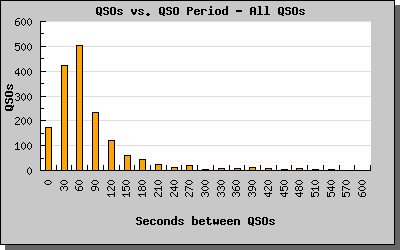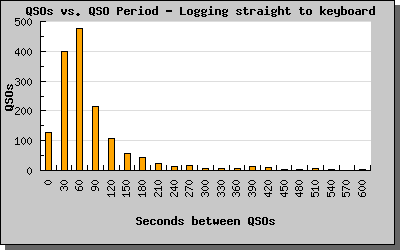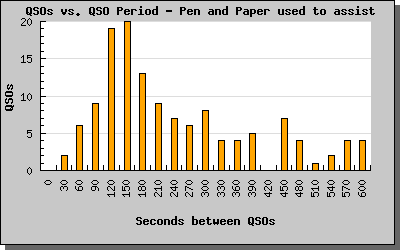Field Day 2008 was great for us. Our wide area wireless network worked pretty well and every station could monitor progress of the whole group.
This year we extensively used the “operator initials” field in the N3FJP Field Day Network 2.8 logging software package. Operators used their call-sign as their ‘initials’ while honored guests used their actual initials.
The site-wide log offered many great analysis possibilities. One particularly interesting metric we tracked this year was QSO rates. We generated graphs of QSO totals vs. Time Between QSOs. Here is an example of the entire log…
We are able to further parse the QSO data by operator, mode, band and any other parameter recorded by the very nice N3FJP Field Day Network logging software.
This year was especially cool because many operators who are not regular contesters made an effort to come by and operate. This is fantastic. We had high hopes to make our 4A Field Day operation inviting to all our members young and old. Indeed young and old came out and had a great time.
What I noticed about some of the older operators was their desire to use pen and paper to record call-signs and exchange information of a QSO and then move to the computer keyboard to record the QSO. This frequently resulted in several dupes since these folks were not capitalizing on the logging computer’s instant dupe checking.
There are many reasons to not use pen and paper, but I wondered if the overall efficiency might be one of them. Since I know which operators used paper and since the wonderful N3FJP software records each operator’s identity all I did was add a field to the database and marked the QSOs initially recorded on paper.
Here is the graph of the very same Field Day results of the operators who logged straight to computer…
…and here is the graph showing the performance of the paper users…
It seems at least a little clear that jotting down QSO information on paper in a contesting environment places an obvious obstacle to operator efficiency. If you look at the graphs above it is clear that most of the QSOs made were not only made more efficiently, but in far greater numbers by the operators skipping the use of paper.
Many good Ham Radio Contest Logging software packages exist to help the Amateur Radio operator record those all important QSOs. Good titles to consider include N3FJP, DX4Win, Ham Radio Deluxe, N1MM. Prolog2k, Winlog32 and WriteLog. Instant Dupe Checking alone should make you want to remove paper form your logging flow.
There are many reasons why data is different between groups of attributes like paper and non-paper QSO loggers. Is it jumping to conclusions? You be the judge.



